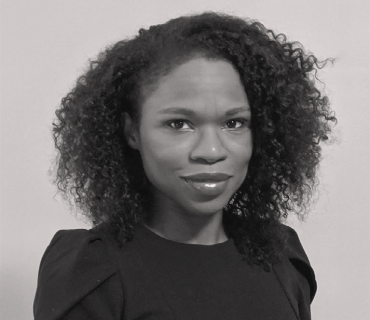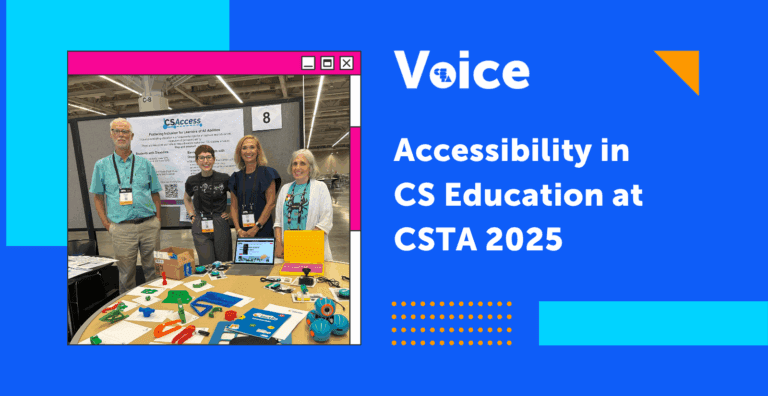
Eboni Zook is passionate about increasing STEM learning opportunities for young women of color and students from under-resourced communities.
Full Story
Eboni Zook is passionate about increasing STEM learning opportunities for young women of color and students from under-resourced communities. Zook currently teaches computer science and technology at the Baltimore Leadership School for Young Women, an all-girls public charter school in Baltimore, Maryland.
“I define equity as guiding all students toward higher education, and providing support to allow students to be successful in college,” said Zook. “Often, African-American female students from under-resourced communities are relegated to vocational education due to structural racism manifest in the belief that Black females are best suited to low-wage occupations.”
Baltimore Leadership School for Young Women focuses on cultivating leadership through a college-preparatory program of education. To align with this mission, Zook encourages her students toward intellectual pursuits and opportunities to prepare them for higher education, including internships and summer enrichment. “As I teach, I empower students to make informed, achievement-oriented decisions for their lives that will increase their likelihood of achieving a college education, leading to a purposeful and meaningful life,” said Zook.
“I encourage my students to apply for challenging courses, and to pursue STEM careers by exposing my students to female Computer Scientists, and STEM leaders,” shared Zook. “I want students to make informed decisions about careers based on their intellect and talents, not the limited choices they see before them.”
In her classroom, Zook teaches authentic computer science content, offers advanced computer science courses, and provides opportunities to learn computer science outside of the classroom. When she first began teaching computer science, many of her students shared they spent their class time in previous CS classes writing essays.
“I chose to use the Code.org curriculum, as its value for educational equity aligned with my values as an educator,” said Zook. “Through the Computer Science Discoveries curriculum, my students learned HTML, CSS, and JavaScript. They created web pages, interactive digital cards, digital images, and video games. I engaged my students by connecting their learning to issues that they care about in the community. I believe students felt empowered to engage in social justice about an issue of importance to them.”
For Zook, success is measured by the effort the students display in their work. She allows students to resubmit projects that do not meet rubric requirements because she wants them to know their learning is important enough to warrant a second attempt. Zook measures student growth in creativity and collaboration. “The ways in which I engage students in CS practices allow me to disrupt the inequity in Computer Science education by engaging students in authentic CS learning experiences,” shares Zook.
Outside of the classroom, Zook started an official Girls Who Code club and expanded it to her school’s middle school students who do not have access to computer science courses. The club hosted a volunteer co-facilitator who is an African-American female software programmer.
“I feel that it is important for my students to learn from a role model in the Computer Science industry. Her teaching and her presence provided my students with a vision for what a career in CS can be like,” said Zook.
Zook is working with her Baltimore community to make computer science more equitable. She’s partnered with the school administration to plan a parent program on Digital Citizenship. She encouraged parents to keep an open dialogue about digital behaviors and encouraged them to model positive behaviors. Zook also taught a course to teach her students to pass the Microsoft Office Specialist Excel Exam so they were able to qualify for an internship opportunity at the National Security Administration.
Zook is a woman of action but would like to better learn how to be an advocate for computer science education for female students of color. This is what led her to apply to become a CSTA Equity Fellow.
“Although I feel that I have made strides in increasing access to Computer Science education in my school, I desire to have a greater impact in Baltimore City Public Schools in terms of being a thought leader in providing greater access to CS to girls of color,” shared Zook. “I tend to work in a more grassroots way to bring change.”
She wants to see more women of color pursuing STEM majors and entering STEM careers because of an interest developed in high school. Zook also wants to leverage the tech community to provide opportunities and mentors for her students.
“I hope that I will form a strong network of Computer Science teacher colleagues with whom to share learning and ideas. Currently, the Baltimore City School System does not have a high school Computer Science Specialist, nor high school computer science curriculum. Each school must obtain its own curriculum. I am interested to learn about curricular resources that are culturally responsive and designed for students from under-resourced communities. Overall, I desire mentorship and the knowledge to become a more effective Computer Science teacher for students in urban communities.”
Currently, Zook is working with her fellow cohort members on a handbook for Computer Science Educators about equity in Computer Science education for underrepresented student groups, and how to advocate for equitable Computer Science education in a school district and regionally.
You can learn more about Zook, this year’s cohort, and the CSTA Equity Fellowship program here.



